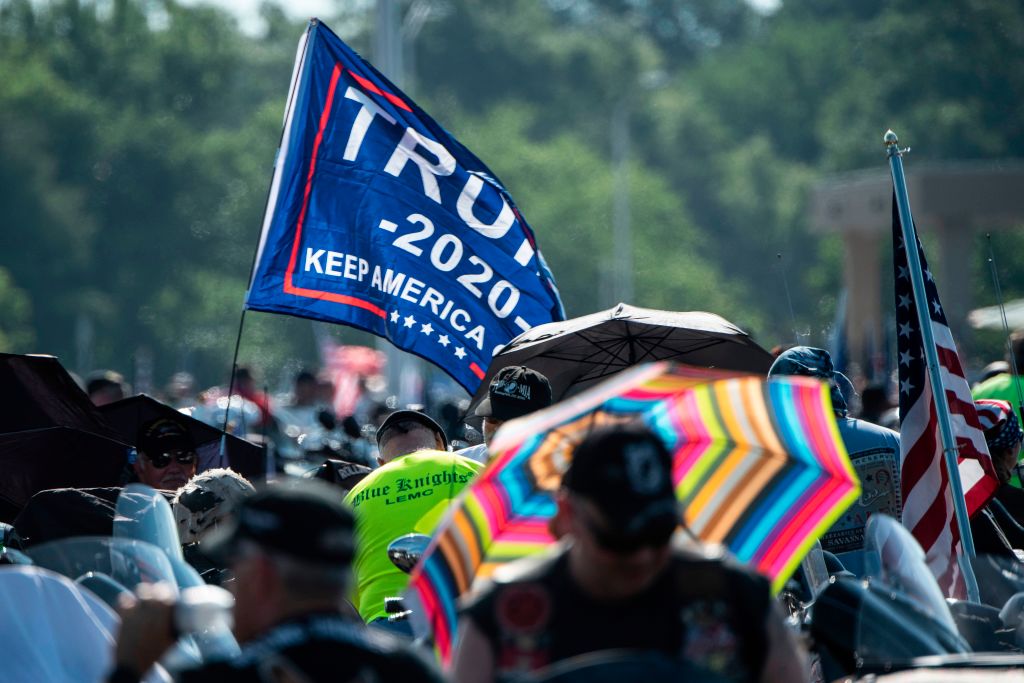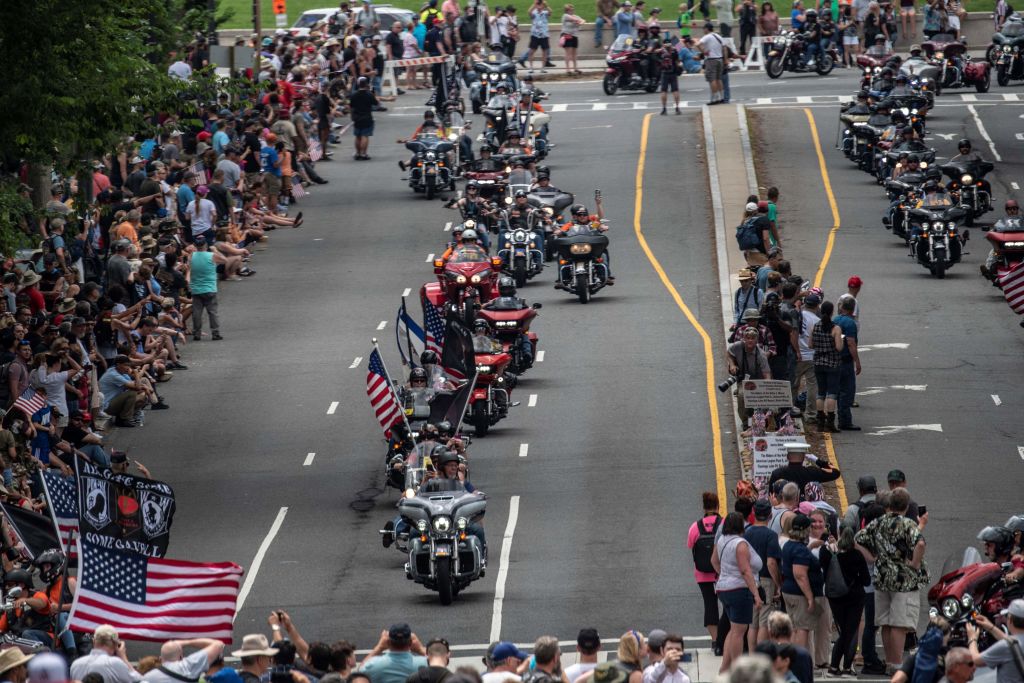Rolling Thunder has held its motorcycle demonstration ride every Memorial Day Weekend in Washington, D.C., for more than three decades—which is why the nonprofit veteran advocacy group’s announcement last fall that 2019 would be the ride’s last year concerned many.
The news made it all the way to President Donald Trump, who tweeted from Japan on Saturday with a pledge to help. On Sunday, he weighed in again––this time declaring that Rolling Thunder would continue in Washington next year, implying he had fixed the problem.
“The Great Patriots of Rolling Thunder WILL be coming back to Washington, D.C. next year, & hopefully for many years to come,” he said. “It is where they want to be, & where they should be.”
Rolling Thunder has organized an annual rally in Washington for 32 years, inviting veterans and bikers to ride together to voice support of veterans missing in action and kept as prisoners of war.
The rally has drawn hundreds of thousands of attendees in years passed, WAMU reports. The group uses the Pentagon’s parking lot and facilities as its staging area.
The President referenced a rift between the Pentagon and the nonprofit that organizes the event. “Thank you to our great men and women of the Pentagon for working it out,” he said.
Despite Trump’s tweet, Rolling Thunder’s founder and executive director Artie Muller affirmed again on Sunday this was the last year for the event in the nation’s capital.
In reference to the President’s comments, Muller said on C-Span that nothing had changed. “I know he means well, but I don’t know what the story is with them working it out with us,” Muller, a Vietnam War veteran, said. “There’d have to be a lot of discussion and a lot of changes for everybody that comes here and our organization that helps put this together.”

Though the organization’s 90 chapters will be continuing local rallies in 2020 and beyond, Muller said the group has no plans to continue its annual ride in the U.S. capital.
In a Stars and Stripes article last December, Mueller said a lack of cooperation from the Pentagon — in addition to rising costs and similar struggles with local police — caused the rally’s demise. The annual “Ride for Freedom” in Washington costs the organization around $200,000 in 2018, Muller told C-Span on Sunday.
Muller told Stars and Stripes that not only was the organization unable to recoup the costs of 2018’s rally, it was also unable to find a new sponsor. “We’re collecting money to help veterans, troops and their families, and spending $200,000 on a run? I can’t justify that,” he told the newspaper.
A large portion of that $200,000 goes directly to the Pentagon for access to their parking lots, which serve as staging areas for the ride, as well as bathrooms and security detail, WTOP reported. “We’re tired of the harassment,” Muller told the Washington TV station. “We’re tired of the aggravation there.”
In a statement to WTOP, Pentagon spokeswoman Sue Gough said that the Pentagon has “worked closely with Rolling Thunder representatives to achieve a safe and successful event,” and denied that reserved areas weren’t accessible to guests.
“All outside events pay fees to use the Pentagon Reservation. The fee includes costs for overtime for security and reimbursement for clean up after an event. Rolling Thunder, Inc. pays only a portion of the total costs incurred by the Pentagon to support the event,” the statement said.

The Metropolitan Police Department said in a statement that it “welcomes those who come here to exercise their First Amendment rights in a safe and peaceful manner,” and that all decisions related to the event’s planning are up to the Pentagon Force Protection and the Department of Defense.
Rolling Thunder, Inc. and the Pentagon did not immediately respond to requests for comment.
The first run was held in 1988, to raise awareness for those still missing after the Vietnam War. It drew 2,500 riders to Washington who demanded that the government account for everyone missing in the war, according to a history on Rolling Thunder’s website.
Operation Rolling Thunder, a 1965 bombing on North Vietnam, was the inspiration for the group’s name. As the motorcycles gear up, their collective roar is a sound “not unlike” that of the bombing, according to their website.
In his C-Span interview, Muller said there’s still a great deal of work to be done in protecting missing soldiers and prisoners of war. “Our government says we leave no man behind, no woman behind, in the military. But they have,” he said.
He also referenced recent U.S. efforts to retrieve bodies of those killed in World War II, but said Congress must work together with Trump to bring home more prisoners of war.
Trump’s advocacy for Rolling Thunder’s issues comes in the wake of his years of commentary on the late Sen. John McCain’s POW status. “He was captured … Does being captured make you a hero? I don’t know. I’m not sure,” he said in a 60 Minutes interview in 1999.
Trump continued that point during his campaign for the Republican presidential nomination and well into his presidency. “[McCain’s] not a war hero,” he said at an event in Iowa in July of 2015. “He was a war hero because he was captured. I like people who weren’t captured.”
More Must-Reads from TIME
- How Donald Trump Won
- The Best Inventions of 2024
- Why Sleep Is the Key to Living Longer
- Robert Zemeckis Just Wants to Move You
- How to Break 8 Toxic Communication Habits
- Nicola Coughlan Bet on Herself—And Won
- Why Vinegar Is So Good for You
- Meet TIME's Newest Class of Next Generation Leaders
Write to Rachel E. Greenspan at rachel.greenspan@time.com